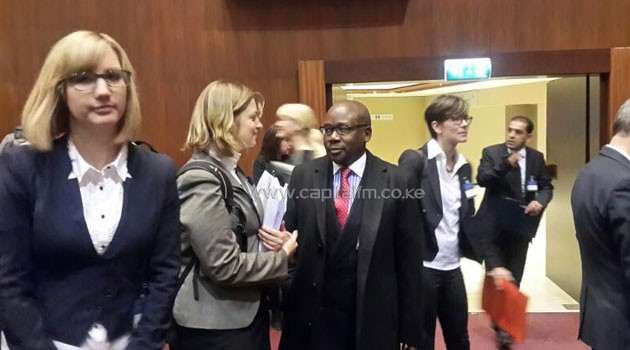
The Kenyan team, at the Assembly of States Parties in The Hague, which includes Attorney General Githu Muigai, are seeking the support of at least 20 African states to oppose the application of Rule 68 which is likely to be amended by the assembly on Wednesday at plenary/FILE
The Kenyan team, at the Assembly of States Parties in The Hague, which includes Attorney General Githu Muigai, are seeking the support of at least 20 African states to oppose the application of Rule 68 which is likely to be amended by the assembly on Wednesday at plenary.
The proposed amendments to Rule 68 states that prior recorded testimony can be introduced in court, instead of hearing the witness in person, when he or she is unable to be physically present in court for various reasons, including death, disappearance, sickness or any other compelling reason.
An official in the Kenyan team told Capital FM News that their initial approach was to lobby against the amendment changed to opposing its application until after one year when it became inevitable that the proposed amendment will be approved at the plenary session Wednesday.
“There are very high chances the amendment will be approved tomorrow [Wednesday], that is why we are lobbying for enough support to oppose its application until after the next assembly next year when we intend to bring up further amendments on it,” the official said.
The technical working group on amendments has been working on the proposal since last year and has already given notice of its intention to table it at Wednesday’s plenary.
A legal expert attending the ongoing assembly told Capital FM News that unlike an amendment of the Rome Statute which can only take effect after one year, change of Rules of Procedure takes effect immediately and will likely impact on the Kenyan cases on President Uhuru Kenyatta, his Deputy William Ruto and radio journalist Joshua arap Sang who are accused of orchestrating the 2007/8 violence.
“It must be opposed, but since it’s headed for approval, we can only oppose its application so that it is deferred until the next assembly next year,” the lawyer said.
International justice experts attending the Assembly of States Parties said the amendments are largely borrowed from the provisions and practices of the two ad hoc tribunals – International Criminal Tribunal for the former Yugoslavia [ICTY] and International Criminal Tribunal for Rwanda [ICTR].
Xavier Jean-Keita, the Principal Counsel Defence at the International Criminal Court has warned that the proposed amendment is inconsistent with applicable law.
“The Defence respectively submits that the proposed amendments should be carefully re-examined by the Assembly of States Parties as they contravene applicable law and practice of the Court and have been adopted without adequately considering the views of the Defence,” Jean-Keita whose role is to advise defence teams at the ICC said, in a documented circulated at the World Forum where the assembly is taking place.
He is particularly worried that, once the rule is amended, the ICC’s Prosecution office will have undue advantage in cases because the defence will not have a chance to cross examine evidence provided by the absentee witnesses.
“These amendments depart from the hierarchy of law as established in the Statute, disregard the principle of orality enshrined in the Court’s Statute and jurisprudence, and deny an accused the minimum guarantee to confront witnesses against him/her.
“This is a fundamental right under the Statute and international human rights,” he said, adding “the proposed amendments raise very real risk of encouraging fabricated evidence and false accusations, prolonging proceedings through increased litigation, which would also increase costs for the Court.”
Dr Philippe Currat, the Secretary General of the International Criminal Bar [ICB], said the proposed amendments will adversely affect the accused, victims and even witnesses.
“A restriction on the accused person’s ability to confront adverse testimony is a derogation of the reach of Article 67 of the Rome Statute,” he said. “The proposed amendment would also undermine the fundamental right of the accused to confront accusers, embodied in all international human rights instruments.”
A working document, prepared by the Kenyan delegation, seen by Capital FM News said the proposed amendment “undermines the principle of equality before the law.”
The Kenyan Attorney General said he was hopeful that the strategy they adopted of opposing its immediate application, if approved will work, given the level of support they have received from nations.
Kenya’s ambassador to the Netherlands Makena Muchiri, Director of Public Prosecutions Keriako Tobiko, President Kenyatta’s Spokesman Manoah Esipisu and Emmanuel Talam of the Deputy President’s office who are part of the Kenyan team at the assembly were equally hopeful they will get the support required from nations to postpone application of the amendment, if approved on Wednesday.









































